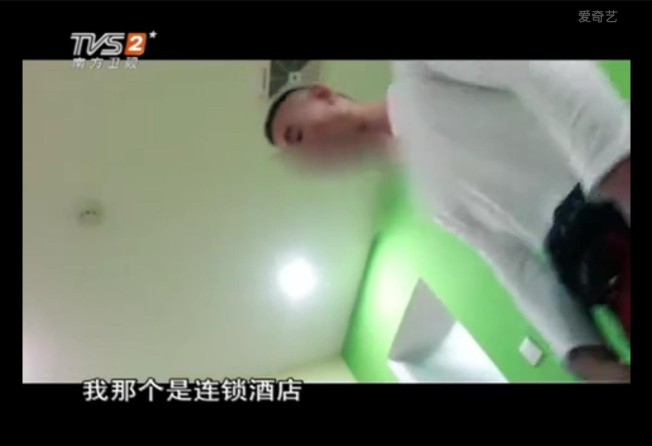Gay rights groups outraged over network's hidden camera footage of male sex worker

Gay rights groups are calling for Southern Television Guangdong to publicly apologise for using hidden camera footage of an undercover reporter meeting with a male sex worker.
The news program aired over three consecutive nights from January 6 to January 8, purporting to investigate the rising rate of HIV infections among young Chinese. It blamed the rise on the growing popularity of online dating websites and sex workers who do not use condoms.
The sex worker in question recognised himself in the footage and turned to gay rights groups for help to sue the television station.
The hidden camera footage, which aired last Wednesday, showed an undercover reporter's liaison with the sex worker - whose face was blurred - in a hotel in Guangzhou, undressing and showering as he talked about how he previously worked in a factory.
When the reporter made an excuse to try to leave the hotel room, the sex worker pleaded with him not to go.
“I have to spend 200 RMB for a hotel and 100 RMB for food…this is my only deal today and I thought you would give me 500 RMB…My family is poor and I give money to them every month,” he told the reporter.
Video: Southern TV sends undercovered reporter to investigate gay prostitution in China
"He contacted me and was very angry, but because he was concerned about further exposing himself with a public lawsuit he gave up on prosecution,” said Hu Zhijun, chief executive of PFLAG (Parents, Friends and Family of Lesbians and Gays) China.
"The conduct of the news station was very unprofessional and caused the victim extreme distress. We are calling for a public apology,” he said.
Southern Television is based in Guangzhou and covers news in Guangdong Province and Hong Kong. It is a sub-network under the state-owned Southern Media Corporation, China’s biggest Cantonese-language television network.
The station did not respond to the South China Morning Post's requests for comment.
Gay rights organisations in mainland China and Hong Kong have issued a joint statement accusing the program of undermining HIV/AIDS prevention work and deepening misconceptions about gay men.
"HIV/AIDS also affects…straight people, women and newborn babies…Around the world, where sex work is illegal sex workers are more vulnerable to AIDS because clients do not want to use condoms or because police consider carrying condoms as evidence [of being a sex worker],” said the statement, which was signed by groups in Shenzhen, Beijing, Kunming, Tianjin, and by Midnight Blue, a male sex workers’ support group in Hong Kong.
Pink Alliance, a conglomerate of gay rights groups in Hong Kong, has also spoken out on the issue, accusing the station of “violently intruding” on the privacy of the people involved in the video and breaching journalistic ethics.
In China, sex work is illegal but flourishes across the country, from rural areas to large and small cities. Sex between women and men is the main channel for the transmission of HIV/AIDS and sex workers are a key affected population, according to China’s Ministry of Health. A recent report by medical journal The Lancet found that HIV prevalence among Chinese sex workers increased from 0.02 per cent in 1996 to 0.6 per cent in 2011.
Tim Hamlett, a professor of journalism at Baptist University, said hidden camera subjects rarely bring their complaints to court in both the mainland and Hong Kong. But he said most reputable news organizations would consider using hidden cameras only if there was no other way to get a story that would have significant public benefits, whereas the practice is more frequently used in China.
"The problem with Southern Television’s decision was that it was not justified. It would presumably be possible to find a male sex worker willing to be interviewed about what he does. I suspect that they succumbed to the temptation to produce the most sensational footage,” Hamlett said.
In 2009, CCTV-2, the financial channel of China Central Television, caused controversy over a report involving the use of hidden pinhole cameras to accuse doctors at a Beijing hospital of operating without licenses. The story generated public outrage, and the Ministry of Health responded by saying it was legal for medical students and graduates to work in hospitals.